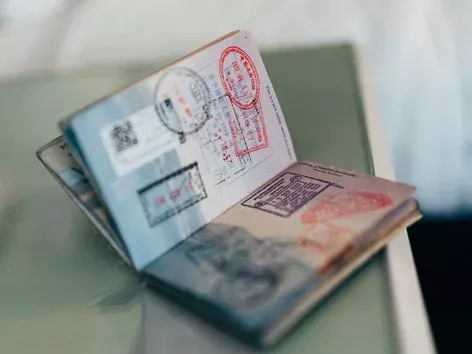Europe Work Visa: everything you need to know
Table of contents
- Citizens of which countries need a visa to work in Europe?
- Types of European work visas
- In which European countries is it easiest to get a work visa?
- The procedure for obtaining a work visa in Europe
- List of documents for obtaining a European work visa
- How long can you apply for a European work visa?
- How long does it take to apply for a European work visa?
- What is the cost of a European work visa?
- What positions can you work with a European work visa?

Anyone who meets the criteria and requirements set by European countries can work in Europe. We will tell you which citizens of which countries need to obtain a visa to work in Europe, the list of documents required for its issuance and other important details
European countries are among the most developed countries in the world. Expats go to work in the EU because the region has a high standard of living, decent pay and career prospects. About 3 million citizens of non-EU countries apply for a work permit in Europe every year. 70% of all permits are issued by France, Italy, Spain and Portugal.
A European work visa gives a foreigner the right to live and work in the EU. However, the permit procedure has its own peculiarities.
How to issue a visa? What is the validity period of the European work visa? Who needs to issue a work permit in Europe? Everything you need to know about the European work visa in our material.
Treatment abroad: do Ukrainians need health insurance in Europe?
Top 9 countries for which it is easiest to get a work visa: the best options.
Citizens of which countries need a visa to work in Europe?
A citizen of any EU country does not need to issue a work visa to work in another state of the region. Citizens of Australia, Canada, Israel, Japan, New Zealand, Switzerland and the USA also do not need a visa to work in Europe. However, upon arrival in the country where they will work, expats must obtain a residence and work permit.
Citizens of the rest of the world who come from outside the EU, but wish to work in Europe, have a job offer from a European employer and meet the qualification requirements, can submit documents for a work visa.
Types of European work visas
There is no single European work visa or Schengen work visa. You can work in Europe if you issue a national visa (D) for the purpose of employment in the chosen country of the region.
A work permit for highly qualified workers – a blue card – is quite common. It is available in 25 of the 27 EU member states. Exceptions are Denmark and Ireland.
Many European countries offer digital nomad visas. Among them are Portugal, Croatia, the Czech Republic, Estonia, Germany, Hungary, Greece, Iceland, Malta, Romania, Spain and Norway.
Germany allows job seekers to apply for a special visa and move to the country without an offer of employment and look for work on the spot.
Poland offers a work visa for seasonal work.
In which European countries is it easiest to get a work visa?
Most European countries have fairly strict rules for issuing work visas. Of course, with proper qualifications and an offer from an employer, a foreigner can apply for a visa to work in any EU country, however, according to statistics, the lowest percentage of refusals is in the following countries: Estonia, Norway, Germany, the Netherlands, Ireland and the Czech Republic.
The procedure for obtaining a work visa in Europe
Each European country has its own requirements for the work visa procedure, which may differ depending on your nationality, country of residence and type of work visa. However, the general process of applying for a European work visa includes the following steps:
1. Choose the European country in which you want to work.
2. Receive a job offer from an employer from this country.
3. Collect the visa application documents and pay the fee.
4. Schedule a visa interview.
5. Come to the interview with all the necessary documents.
6. Wait for the visa to be issued.
You must apply for a visa at the embassy, consulate or visa center of the country where you are going to work, in the country of your residence.
List of documents for obtaining a European work visa
The criteria and requirements for obtaining a work visa, as well as the application process, mainly depend on the migration policy of each country. However, the standard requirements for a European work visa are as follows:
● Questionnaire for a work visa.
● Valid foreign passport.
● Photo (two or more, depending on the country).
● Certificate of criminal record. A document confirming that you have not committed any crime in the last 5-10 years.
● A contract with a European employer – a document signed by the employer and the applicant, it must specify working conditions and salary.
● Confirmation of professional qualifications for the proposed job.
● Confirmation of the availability of a place to live (apartment lease agreement, certificate of ownership, etc.)
● Document about education.
● Language proficiency certificate (if necessary).
A detailed list of documents can be obtained from the diplomatic institution of the country to which you plan to issue a visa.
The procedure for obtaining a European work visa differs depending on the country, and most states offer different types of work permits. The consultation of a highly qualified immigration and employment lawyer will help you choose the required type of visa and prepare the appropriate package of documents.
How long can you apply for a European work visa?
In most European countries, a work visa is issued for a period of one year (12 months). You can also apply for a visa extension after its expiration date.
The exact duration of a work visa depends on the country that issues the visa: Denmark can issue a work permit for up to 4 years, in Austria you can issue a document for 2 years at once, etc.
How long does it take to apply for a European work visa?
You must apply for a work visa to Europe at least two months before your planned trip. European embassies consider an application for a work visa within six weeks. In extreme cases, the processing time can be extended up to 12 weeks.
What is the cost of a European work visa?
There is no single cost of a European work visa, it differs from country to country. The cheapest visa in Cyprus (€60), Germany (€75) and Slovenia (€77). The most expensive is in Ireland (€500), Great Britain (€695) and Norway (€610). The average cost of a European work visa is from 100 to 200 euros.
What positions can you work with a European work visa?
If you have the right qualifications, skills and experience, you can work in any position you choose.
List of the most common professions in which expats with a European work visa work: software engineers, mechanical engineers, social workers, psychologists, lawyers, chemists, biologists, doctors and nurses, teachers, researchers, scientists, real estate agents and architects.
European countries have created the perfect work-life balance over the years, making them the best places to work in the world. The advantage is that you can move to Europe as a whole family, if there are financial opportunities and a place to live together.
Moving to Europe will be a new stage in the career of an expat, will present new perspectives and opportunities for self-realization.
Products from Visit World for a comfortable trip:
Medical insurance all over the world;
Legal advice from a local specialist on visa and migration issues (to receive the service, select the country of interest and citizenship).
We monitor the accuracy and relevance of our information. Therefore, if you see any error or discrepancy, please write to our hotline.
Recommended articles
2 min
Education
Business study abroad: the best countries, universities and top educational programs in the world
Studying abroad in business can be a rewarding and valuable experience, as it offers unique opportunities for personal and professional growth. Learn about the best universities and the most popular business programs in the world in our article.
18 Jul. 2023
More details2 min
Travels
Is it safe to travel to Egypt in 2023?
Egypt, a country rich in thousands of years of historical treasures, has been one of the most popular tourist destinations for many years. But is it safe to travel to Egypt now? Read more in our article.
19 Jul. 2023
More details2 min
Travels
The most dangerous countries in Europe in 2025
Europe is undoubtedly one of the most beautiful and peaceful continents in the world, but it also faces challenges of crime and violence. Find out which countries are the most dangerous in 2025
24 May. 2025
More details2 min
Investment
Austria citizenship by investment: benefits, requirements and application procedure
Recently, the number of people seeking Austrian citizenship through investment has increased. This program is known as Austrian Citizenship by Investment. Here are the benefits of Austrian citizenship and the main requirements for investors
21 Jul. 2023
More detailsAll materials and articles are owned by VisitWorld.Today and are protected by international intellectual property regulations. When using materials, approval from VisitWorld.Today is required.
